Evaluation of Jean Watson's Health Promotion Model Theory in Nursing
VerifiedAdded on 2022/11/22
|6
|1401
|1
Essay
AI Summary
This essay provides a comprehensive overview of Jean Watson's Health Promotion Model Theory, a cornerstone in nursing practice. It delves into the core concepts of the theory, including transpersonal caring relationships, caring occasions, and moments, and explores how these elements contribute to patient health promotion beyond mere medical cures. The essay examines the strengths of the theory, such as its focus on individualized care and spiritual needs, while also addressing its weaknesses, like its limited emphasis on physical health. Furthermore, it analyzes the congruency and relevance of the theory in contemporary nursing, considering its practical application in various healthcare scenarios. The essay concludes by highlighting the theory's contributions to the nursing discipline, emphasizing the importance of holistic care and the nurse-patient relationship in achieving optimal health outcomes.
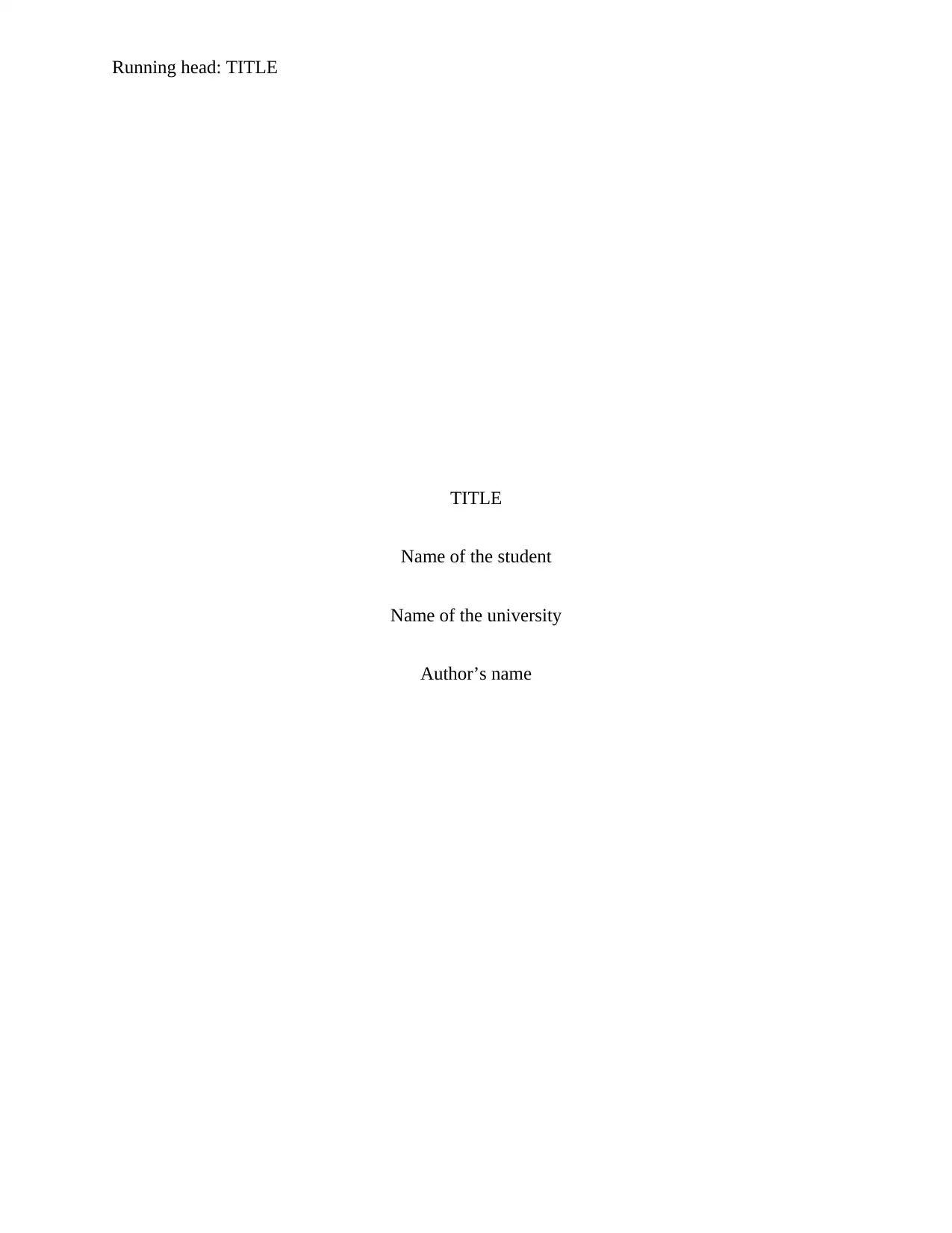
Running head: TITLE
TITLE
Name of the student
Name of the university
Author’s name
TITLE
Name of the student
Name of the university
Author’s name
Paraphrase This Document
Need a fresh take? Get an instant paraphrase of this document with our AI Paraphraser
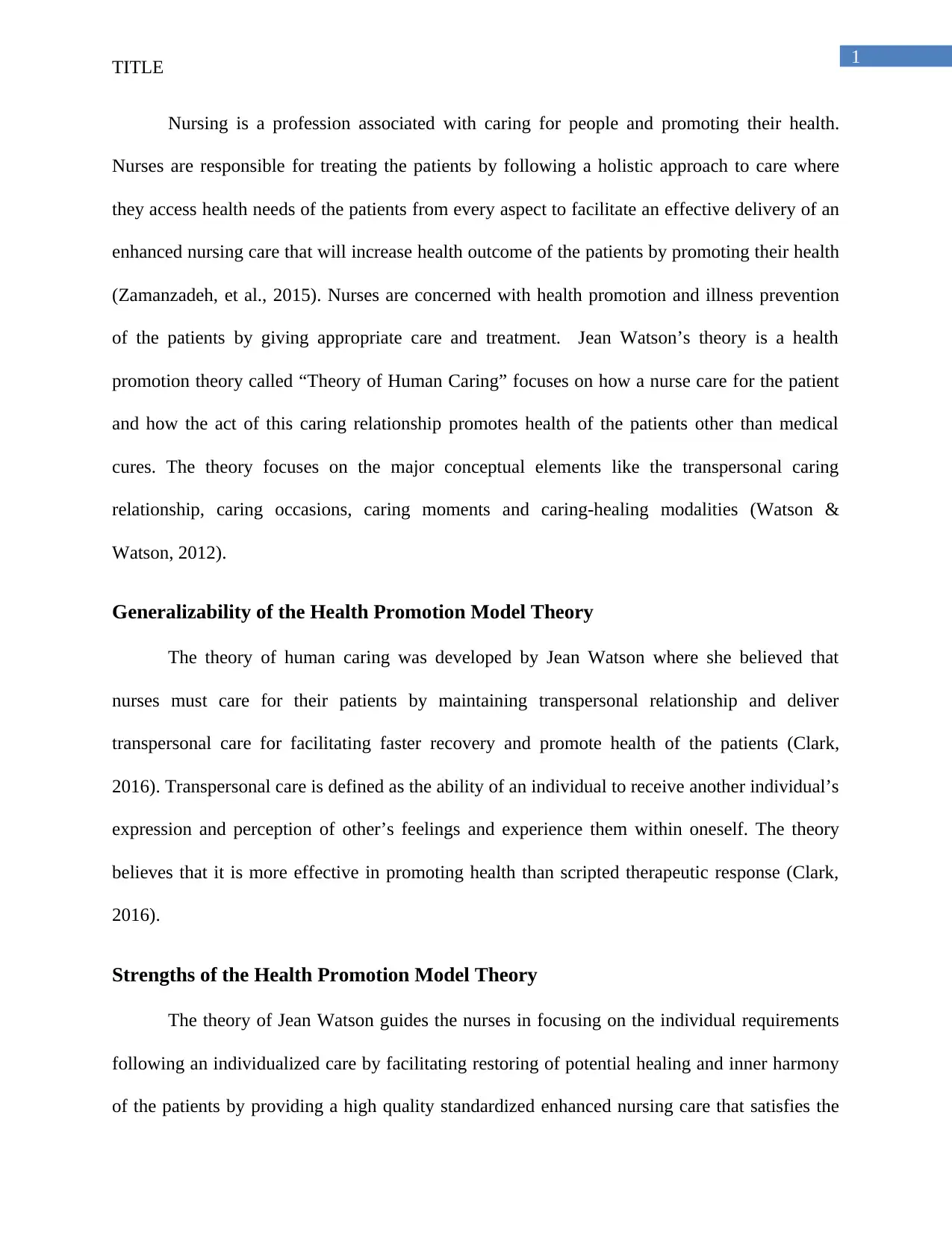
1
TITLE
Nursing is a profession associated with caring for people and promoting their health.
Nurses are responsible for treating the patients by following a holistic approach to care where
they access health needs of the patients from every aspect to facilitate an effective delivery of an
enhanced nursing care that will increase health outcome of the patients by promoting their health
(Zamanzadeh, et al., 2015). Nurses are concerned with health promotion and illness prevention
of the patients by giving appropriate care and treatment. Jean Watson’s theory is a health
promotion theory called “Theory of Human Caring” focuses on how a nurse care for the patient
and how the act of this caring relationship promotes health of the patients other than medical
cures. The theory focuses on the major conceptual elements like the transpersonal caring
relationship, caring occasions, caring moments and caring-healing modalities (Watson &
Watson, 2012).
Generalizability of the Health Promotion Model Theory
The theory of human caring was developed by Jean Watson where she believed that
nurses must care for their patients by maintaining transpersonal relationship and deliver
transpersonal care for facilitating faster recovery and promote health of the patients (Clark,
2016). Transpersonal care is defined as the ability of an individual to receive another individual’s
expression and perception of other’s feelings and experience them within oneself. The theory
believes that it is more effective in promoting health than scripted therapeutic response (Clark,
2016).
Strengths of the Health Promotion Model Theory
The theory of Jean Watson guides the nurses in focusing on the individual requirements
following an individualized care by facilitating restoring of potential healing and inner harmony
of the patients by providing a high quality standardized enhanced nursing care that satisfies the
TITLE
Nursing is a profession associated with caring for people and promoting their health.
Nurses are responsible for treating the patients by following a holistic approach to care where
they access health needs of the patients from every aspect to facilitate an effective delivery of an
enhanced nursing care that will increase health outcome of the patients by promoting their health
(Zamanzadeh, et al., 2015). Nurses are concerned with health promotion and illness prevention
of the patients by giving appropriate care and treatment. Jean Watson’s theory is a health
promotion theory called “Theory of Human Caring” focuses on how a nurse care for the patient
and how the act of this caring relationship promotes health of the patients other than medical
cures. The theory focuses on the major conceptual elements like the transpersonal caring
relationship, caring occasions, caring moments and caring-healing modalities (Watson &
Watson, 2012).
Generalizability of the Health Promotion Model Theory
The theory of human caring was developed by Jean Watson where she believed that
nurses must care for their patients by maintaining transpersonal relationship and deliver
transpersonal care for facilitating faster recovery and promote health of the patients (Clark,
2016). Transpersonal care is defined as the ability of an individual to receive another individual’s
expression and perception of other’s feelings and experience them within oneself. The theory
believes that it is more effective in promoting health than scripted therapeutic response (Clark,
2016).
Strengths of the Health Promotion Model Theory
The theory of Jean Watson guides the nurses in focusing on the individual requirements
following an individualized care by facilitating restoring of potential healing and inner harmony
of the patients by providing a high quality standardized enhanced nursing care that satisfies the
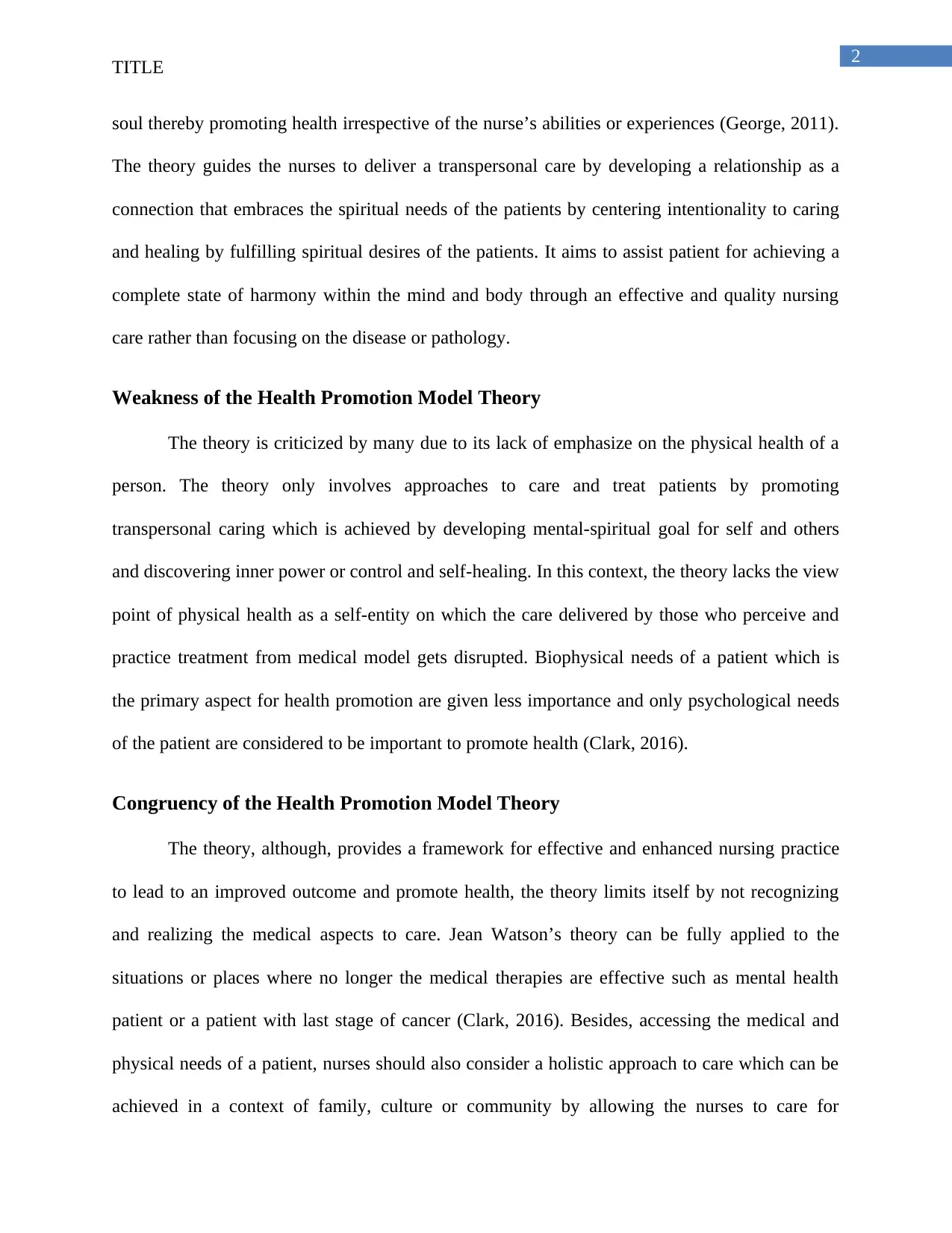
2
TITLE
soul thereby promoting health irrespective of the nurse’s abilities or experiences (George, 2011).
The theory guides the nurses to deliver a transpersonal care by developing a relationship as a
connection that embraces the spiritual needs of the patients by centering intentionality to caring
and healing by fulfilling spiritual desires of the patients. It aims to assist patient for achieving a
complete state of harmony within the mind and body through an effective and quality nursing
care rather than focusing on the disease or pathology.
Weakness of the Health Promotion Model Theory
The theory is criticized by many due to its lack of emphasize on the physical health of a
person. The theory only involves approaches to care and treat patients by promoting
transpersonal caring which is achieved by developing mental-spiritual goal for self and others
and discovering inner power or control and self-healing. In this context, the theory lacks the view
point of physical health as a self-entity on which the care delivered by those who perceive and
practice treatment from medical model gets disrupted. Biophysical needs of a patient which is
the primary aspect for health promotion are given less importance and only psychological needs
of the patient are considered to be important to promote health (Clark, 2016).
Congruency of the Health Promotion Model Theory
The theory, although, provides a framework for effective and enhanced nursing practice
to lead to an improved outcome and promote health, the theory limits itself by not recognizing
and realizing the medical aspects to care. Jean Watson’s theory can be fully applied to the
situations or places where no longer the medical therapies are effective such as mental health
patient or a patient with last stage of cancer (Clark, 2016). Besides, accessing the medical and
physical needs of a patient, nurses should also consider a holistic approach to care which can be
achieved in a context of family, culture or community by allowing the nurses to care for
TITLE
soul thereby promoting health irrespective of the nurse’s abilities or experiences (George, 2011).
The theory guides the nurses to deliver a transpersonal care by developing a relationship as a
connection that embraces the spiritual needs of the patients by centering intentionality to caring
and healing by fulfilling spiritual desires of the patients. It aims to assist patient for achieving a
complete state of harmony within the mind and body through an effective and quality nursing
care rather than focusing on the disease or pathology.
Weakness of the Health Promotion Model Theory
The theory is criticized by many due to its lack of emphasize on the physical health of a
person. The theory only involves approaches to care and treat patients by promoting
transpersonal caring which is achieved by developing mental-spiritual goal for self and others
and discovering inner power or control and self-healing. In this context, the theory lacks the view
point of physical health as a self-entity on which the care delivered by those who perceive and
practice treatment from medical model gets disrupted. Biophysical needs of a patient which is
the primary aspect for health promotion are given less importance and only psychological needs
of the patient are considered to be important to promote health (Clark, 2016).
Congruency of the Health Promotion Model Theory
The theory, although, provides a framework for effective and enhanced nursing practice
to lead to an improved outcome and promote health, the theory limits itself by not recognizing
and realizing the medical aspects to care. Jean Watson’s theory can be fully applied to the
situations or places where no longer the medical therapies are effective such as mental health
patient or a patient with last stage of cancer (Clark, 2016). Besides, accessing the medical and
physical needs of a patient, nurses should also consider a holistic approach to care which can be
achieved in a context of family, culture or community by allowing the nurses to care for
⊘ This is a preview!⊘
Do you want full access?
Subscribe today to unlock all pages.

Trusted by 1+ million students worldwide
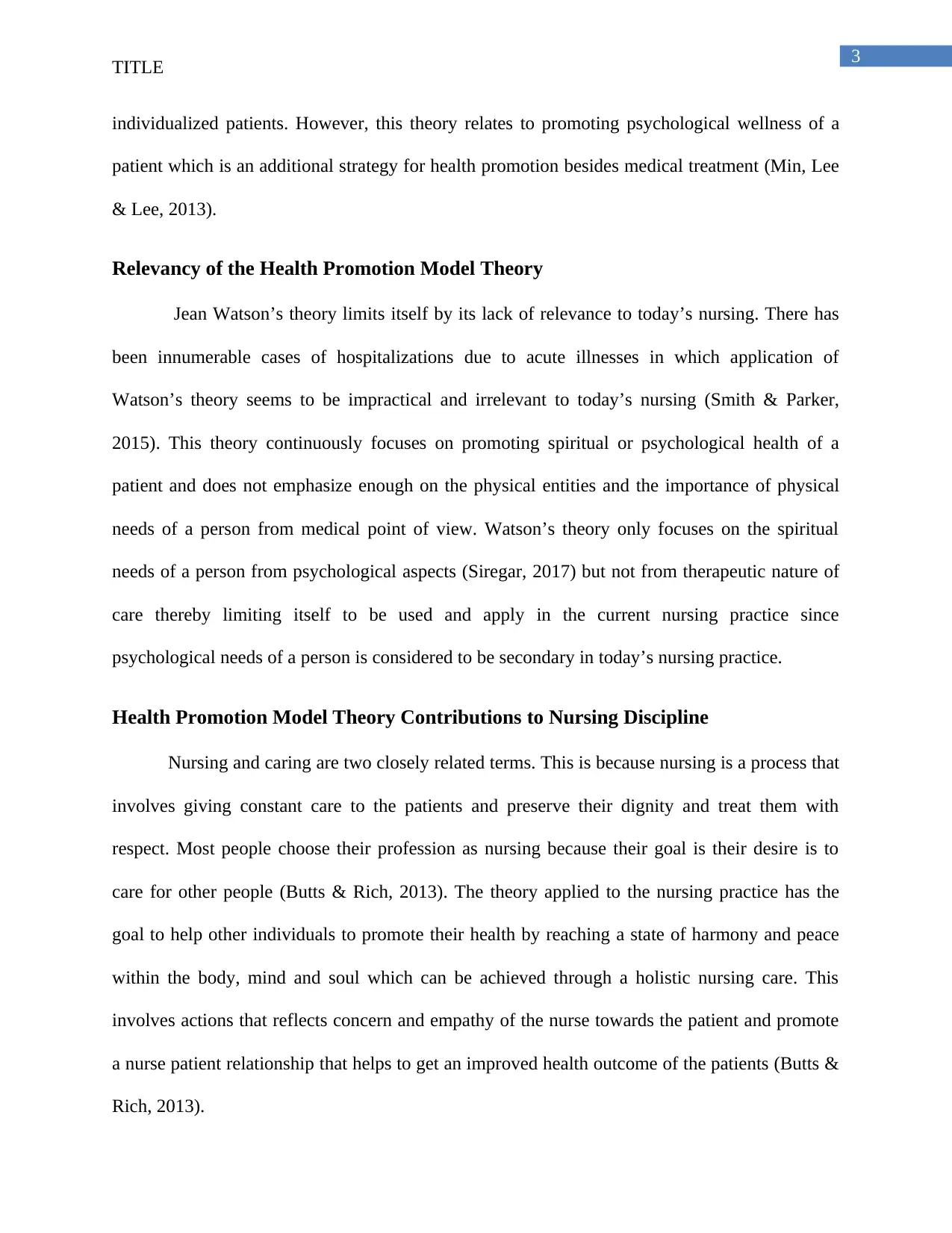
3
TITLE
individualized patients. However, this theory relates to promoting psychological wellness of a
patient which is an additional strategy for health promotion besides medical treatment (Min, Lee
& Lee, 2013).
Relevancy of the Health Promotion Model Theory
Jean Watson’s theory limits itself by its lack of relevance to today’s nursing. There has
been innumerable cases of hospitalizations due to acute illnesses in which application of
Watson’s theory seems to be impractical and irrelevant to today’s nursing (Smith & Parker,
2015). This theory continuously focuses on promoting spiritual or psychological health of a
patient and does not emphasize enough on the physical entities and the importance of physical
needs of a person from medical point of view. Watson’s theory only focuses on the spiritual
needs of a person from psychological aspects (Siregar, 2017) but not from therapeutic nature of
care thereby limiting itself to be used and apply in the current nursing practice since
psychological needs of a person is considered to be secondary in today’s nursing practice.
Health Promotion Model Theory Contributions to Nursing Discipline
Nursing and caring are two closely related terms. This is because nursing is a process that
involves giving constant care to the patients and preserve their dignity and treat them with
respect. Most people choose their profession as nursing because their goal is their desire is to
care for other people (Butts & Rich, 2013). The theory applied to the nursing practice has the
goal to help other individuals to promote their health by reaching a state of harmony and peace
within the body, mind and soul which can be achieved through a holistic nursing care. This
involves actions that reflects concern and empathy of the nurse towards the patient and promote
a nurse patient relationship that helps to get an improved health outcome of the patients (Butts &
Rich, 2013).
TITLE
individualized patients. However, this theory relates to promoting psychological wellness of a
patient which is an additional strategy for health promotion besides medical treatment (Min, Lee
& Lee, 2013).
Relevancy of the Health Promotion Model Theory
Jean Watson’s theory limits itself by its lack of relevance to today’s nursing. There has
been innumerable cases of hospitalizations due to acute illnesses in which application of
Watson’s theory seems to be impractical and irrelevant to today’s nursing (Smith & Parker,
2015). This theory continuously focuses on promoting spiritual or psychological health of a
patient and does not emphasize enough on the physical entities and the importance of physical
needs of a person from medical point of view. Watson’s theory only focuses on the spiritual
needs of a person from psychological aspects (Siregar, 2017) but not from therapeutic nature of
care thereby limiting itself to be used and apply in the current nursing practice since
psychological needs of a person is considered to be secondary in today’s nursing practice.
Health Promotion Model Theory Contributions to Nursing Discipline
Nursing and caring are two closely related terms. This is because nursing is a process that
involves giving constant care to the patients and preserve their dignity and treat them with
respect. Most people choose their profession as nursing because their goal is their desire is to
care for other people (Butts & Rich, 2013). The theory applied to the nursing practice has the
goal to help other individuals to promote their health by reaching a state of harmony and peace
within the body, mind and soul which can be achieved through a holistic nursing care. This
involves actions that reflects concern and empathy of the nurse towards the patient and promote
a nurse patient relationship that helps to get an improved health outcome of the patients (Butts &
Rich, 2013).
Paraphrase This Document
Need a fresh take? Get an instant paraphrase of this document with our AI Paraphraser
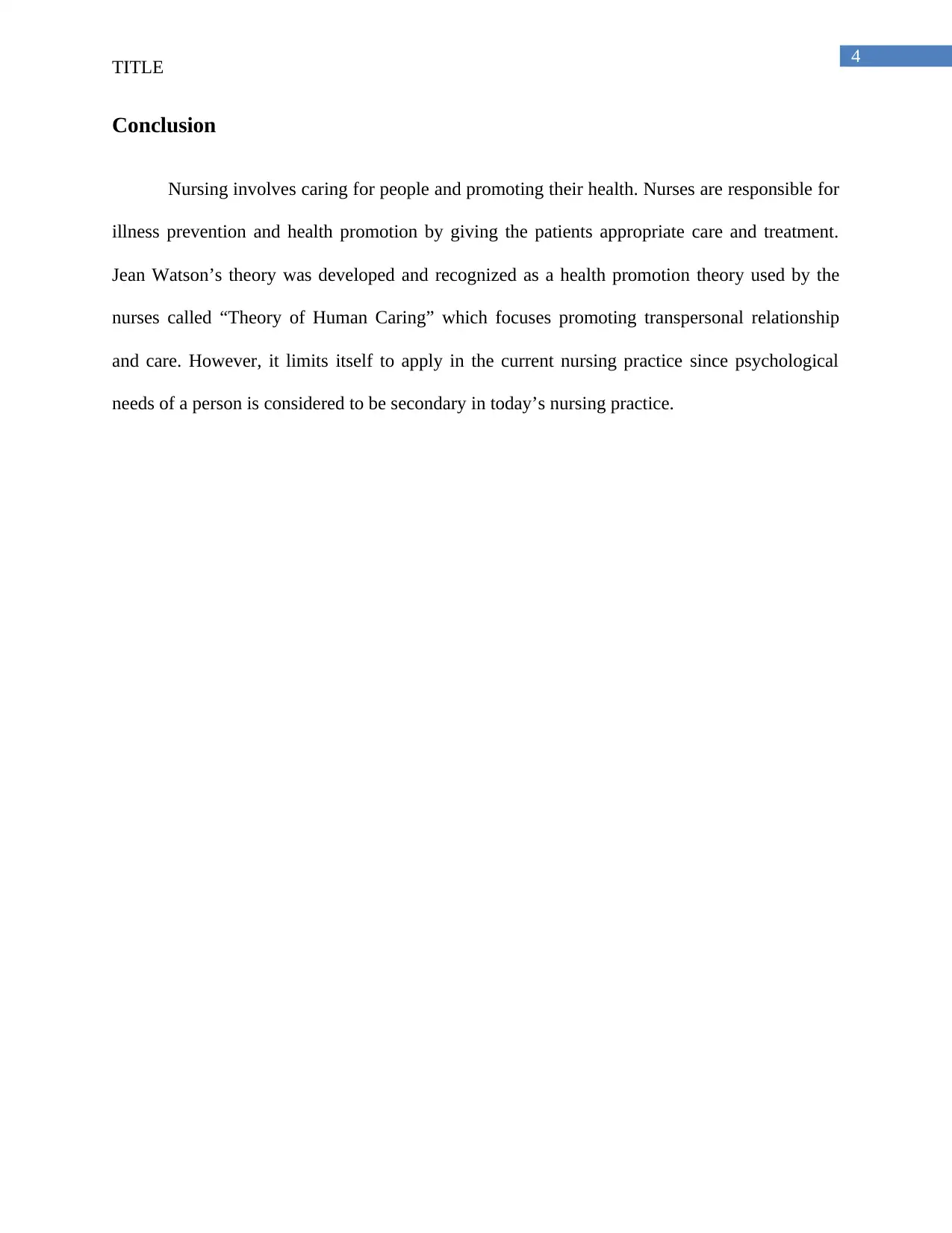
4
TITLE
Conclusion
Nursing involves caring for people and promoting their health. Nurses are responsible for
illness prevention and health promotion by giving the patients appropriate care and treatment.
Jean Watson’s theory was developed and recognized as a health promotion theory used by the
nurses called “Theory of Human Caring” which focuses promoting transpersonal relationship
and care. However, it limits itself to apply in the current nursing practice since psychological
needs of a person is considered to be secondary in today’s nursing practice.
TITLE
Conclusion
Nursing involves caring for people and promoting their health. Nurses are responsible for
illness prevention and health promotion by giving the patients appropriate care and treatment.
Jean Watson’s theory was developed and recognized as a health promotion theory used by the
nurses called “Theory of Human Caring” which focuses promoting transpersonal relationship
and care. However, it limits itself to apply in the current nursing practice since psychological
needs of a person is considered to be secondary in today’s nursing practice.
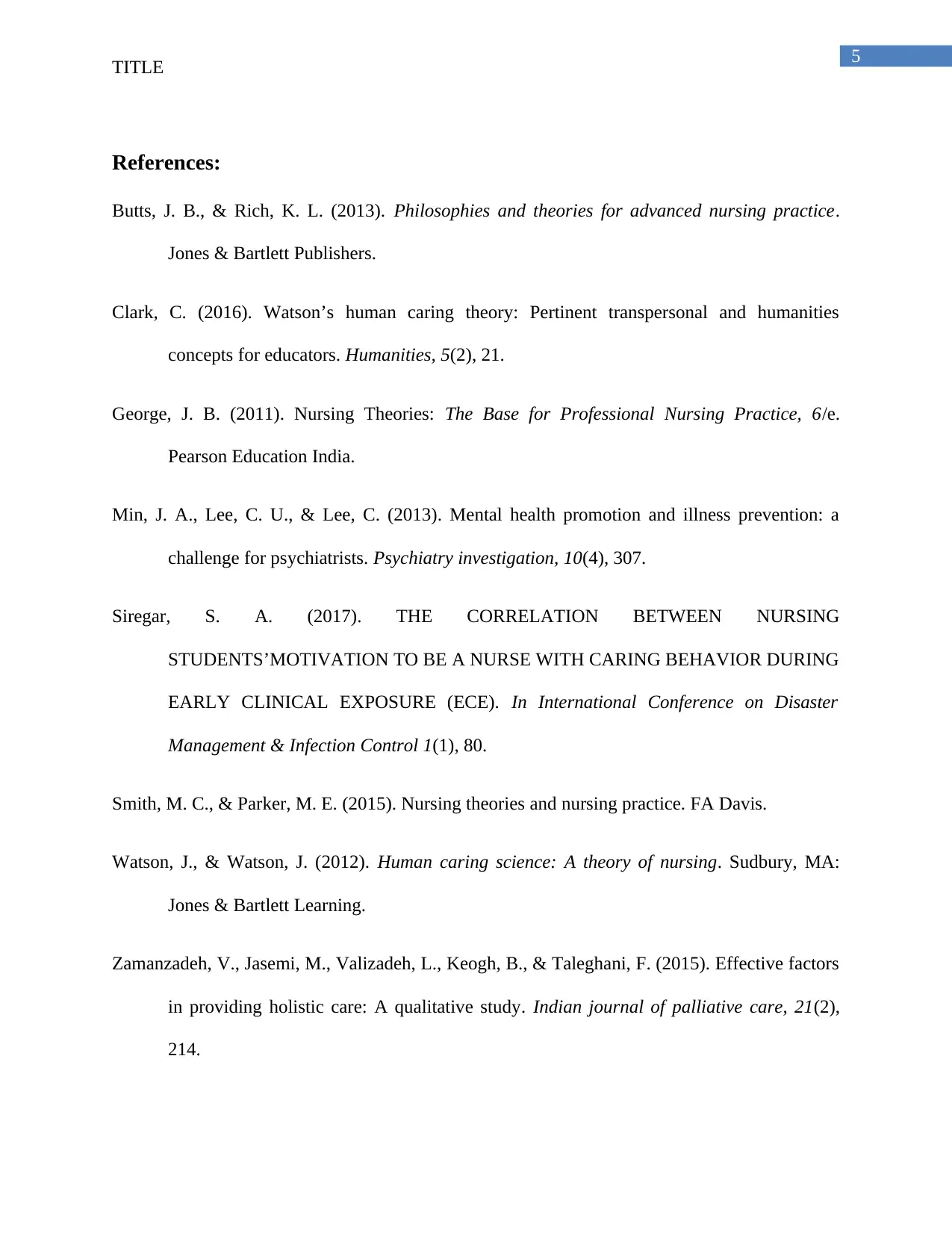
5
TITLE
References:
Butts, J. B., & Rich, K. L. (2013). Philosophies and theories for advanced nursing practice.
Jones & Bartlett Publishers.
Clark, C. (2016). Watson’s human caring theory: Pertinent transpersonal and humanities
concepts for educators. Humanities, 5(2), 21.
George, J. B. (2011). Nursing Theories: The Base for Professional Nursing Practice, 6/e.
Pearson Education India.
Min, J. A., Lee, C. U., & Lee, C. (2013). Mental health promotion and illness prevention: a
challenge for psychiatrists. Psychiatry investigation, 10(4), 307.
Siregar, S. A. (2017). THE CORRELATION BETWEEN NURSING
STUDENTS’MOTIVATION TO BE A NURSE WITH CARING BEHAVIOR DURING
EARLY CLINICAL EXPOSURE (ECE). In International Conference on Disaster
Management & Infection Control 1(1), 80.
Smith, M. C., & Parker, M. E. (2015). Nursing theories and nursing practice. FA Davis.
Watson, J., & Watson, J. (2012). Human caring science: A theory of nursing. Sudbury, MA:
Jones & Bartlett Learning.
Zamanzadeh, V., Jasemi, M., Valizadeh, L., Keogh, B., & Taleghani, F. (2015). Effective factors
in providing holistic care: A qualitative study. Indian journal of palliative care, 21(2),
214.
TITLE
References:
Butts, J. B., & Rich, K. L. (2013). Philosophies and theories for advanced nursing practice.
Jones & Bartlett Publishers.
Clark, C. (2016). Watson’s human caring theory: Pertinent transpersonal and humanities
concepts for educators. Humanities, 5(2), 21.
George, J. B. (2011). Nursing Theories: The Base for Professional Nursing Practice, 6/e.
Pearson Education India.
Min, J. A., Lee, C. U., & Lee, C. (2013). Mental health promotion and illness prevention: a
challenge for psychiatrists. Psychiatry investigation, 10(4), 307.
Siregar, S. A. (2017). THE CORRELATION BETWEEN NURSING
STUDENTS’MOTIVATION TO BE A NURSE WITH CARING BEHAVIOR DURING
EARLY CLINICAL EXPOSURE (ECE). In International Conference on Disaster
Management & Infection Control 1(1), 80.
Smith, M. C., & Parker, M. E. (2015). Nursing theories and nursing practice. FA Davis.
Watson, J., & Watson, J. (2012). Human caring science: A theory of nursing. Sudbury, MA:
Jones & Bartlett Learning.
Zamanzadeh, V., Jasemi, M., Valizadeh, L., Keogh, B., & Taleghani, F. (2015). Effective factors
in providing holistic care: A qualitative study. Indian journal of palliative care, 21(2),
214.
⊘ This is a preview!⊘
Do you want full access?
Subscribe today to unlock all pages.

Trusted by 1+ million students worldwide
1 out of 6
Related Documents
Your All-in-One AI-Powered Toolkit for Academic Success.
+13062052269
info@desklib.com
Available 24*7 on WhatsApp / Email
![[object Object]](/_next/static/media/star-bottom.7253800d.svg)
Unlock your academic potential
Copyright © 2020–2026 A2Z Services. All Rights Reserved. Developed and managed by ZUCOL.





